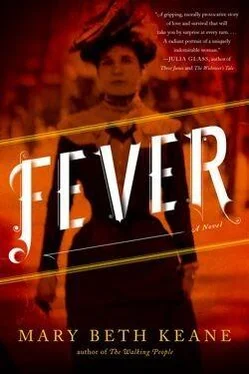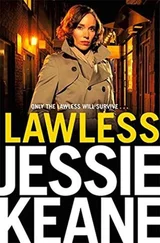I’ve inquired about the ferry and since it doesn’t go on Sundays except for the hospital people I will plan on seeing you there a week from Saturday. Maybe you can let the correct people know that I’m coming so that they don’t give me any trouble when I get there. We can take a walk or do whatever it is you do to pass time. I just want to see you.
Until then,
Alfred Briehof
There were several details about this letter Mary didn’t like. For a start, there was, “I’d almost forgotten.” Nor did she like “two years… Maybe more.” Most of all, she did not like the formality of his signature, “Alfred Briehof.”
Alfred had a pushcart once. He’d had many jobs, but the pushcart months stood out. He said he was sick of hauling coal baskets, and even more sick of emptying ash cans, and above everything sick of answering to a boss. He had had just about every type of physical employment a man could have, and his body needed a break. By his own description he was a genial person and liked to look his fellow man in the face. So he went out and rented a pushcart for twenty-five cents a day. “It’s standing, Mary,” he said. “Standing and talking. And making a living besides.” Alfred preferred to sit while talking, and preferred most of all to sit with a glass of strong liquor nearby, but Mary didn’t point out any of this. It was possible, she supposed, for him to know himself a little better than she knew him, so she swallowed her concerns and said it was a great idea. She knew the butchers of the East Side better than he did, knew which of them kept their thumbs on the scales, which stored their meat on cellar floors where the rain seeped in and sewer pipes might burst, so she helped him find a supplier. There were already three poultrymen on the street where he planned to set up, so he started out selling cuts of beef, pork, and lamb. For a quick lunch to make his cart known he offered slabs of corned beef with a side of beans, a boiled potato for an extra five cents. Mary showed him how to keep it hot, how much to put on the plate.
By the end of the very first month he learned that meat was not the thing. Fat black flies pestered him all day long, laying their eggs while doing so, and made themselves so at home on his cart that he was forced to switch to fruit. The Jewish and Italians had the advantage with the fruit suppliers, taking all the semirot for themselves and leaving to the rest of the peddlers only the best fruit, for which the suppliers had to charge full price. Between the cost of the good fruit and the cart and the tipping of police officers and the paying off of the grocer from whom he rented sidewalk space, plus the nod to the collector and the man-of-influence, who was no more than a saloon keeper up the block, Alfred was deep in the red after only two or three more months. On top of that, since he was set up next to one of the poultrymen, the flies came anyway, and hopped from the putrid carcasses the other peddler had cast behind his cart over to Alfred’s lovely apples and pears, where they perched and laid more eggs.
Once he gave up on fruit, he switched to hot corn, and that went all right for a while, maybe three or four months. But he got bored with corn and switched to something that no one else for ten blocks thought to sell — children’s toys. Small toy boats. Wooden horses. Dolls for girls. Noisemakers. Funny hats. Toys were the best yet: Alfred opened his cart for business around nine in the morning, and closed before supper, by four. There was no worry about rot. No worry about his goods baking in the sun. Even the children left him alone except to buy what he offered. When the fruit carts got pelted with their own goods, and the fish cart got overwhelmed, overturned, and rolled down Forsyth Street, Alfred was left alone to sell for five cents what he’d purchased for three.
When Mary looked back on the best days with Alfred, leaving out the early days, when they were both so young and had nothing in the world to do but spend their days off taking walks or sipping coffee, the time that Alfred spent as a toy vendor was the happiest in their entire history. Mary remembered visiting him on his corner, the way he was with the children who approached him, drawing them in with his promise of shining train cars and paper birds. Even the ones who showed up with only a penny could buy a sweet. It was a good time, and it lasted longer than Mary expected. One whole year: October 1904 to October 1905. And then, about the time the weather turned cold, he began arriving home in a quiet mood. He pushed his food around his plate. Where once he would say that it was a great life, he took to saying it was a good enough life, for the time being.
“Maybe you want your own store?” Mary suggested. It was not impossible. With a few more years of saving, the right rent, and the right location, maybe it could happen. 1905 had been a very good year for Mary. She’d worked continuously, and on her days off she’d taken side jobs cooking for Ladies’ Luncheons.
But Alfred was shocked at the suggestion. “My own store? What I want is fewer toys in my life, Mary, not more. These kids”—he put his head in his hands—“you wouldn’t believe the noise they make. I caught one putting a handful of sweets in his pocket without paying, and when I made him turn his pockets inside out he said he had paid when I know very well he hadn’t. I would’ve thrashed the kid if his father hadn’t been standing right there, grinning, probably telling the boy what to do. They’re worse than the flies.”
He began sleeping late, opening his cart at noon, leaving at two. On the same short block as Alfred’s cart were twenty-four others, all packed in tightly against one another. Most were food peddlers, and Alfred claimed that under their carts was a year’s worth of garbage. Mary didn’t see why this was so upsetting to him all of a sudden, when it had been like that all along. Unlike other neighborhoods, where the garbage piles were removed regularly by the Department of Sanitation, the rubbish on the Lower East Side was packed four or five inches deep all along the block, and there was no skirting it. Each day’s new garbage got trampled underfoot by the crowds, and when the city sweepers came with their wispy brooms on Tuesday mornings it was like using a teaspoon to empty beaches of sand.
“But it’s getting to winter now. Winter always smells better than summer.”
Alfred could not be convinced.
When the first snowfall came he didn’t bother going to his cart at all, and instead checked with the Department of Street Cleaning to see if they needed an extra man on their snow-removal crew. The DSC took him on, gave him a crisp white uniform with matching hat, and out he went to pick up his cart, broom, and shovel with all the other white wings. Colonel Waring, New York City’s latest street-cleaning commissioner, referred to the white wings as his army, and Mary supposed it was an army of sorts, an army fighting against the enemy garbage, which was as powerful and intimidating as any foreign invader. But in February 1906, after a record-breaking snowfall, and after the DSC had to go upstate to Otisville to draft seventy-five additional men from the sanatorium to help clear the snow, they told Alfred to turn in his uniform.
“What did you do?” Mary asked when she found out. It was a habit she couldn’t seem to shake, asking questions she’d never get answers to. “They’re desperate for men. They’re advertising everywhere. And in the middle of that they let you go?”
When she could see he wasn’t going to answer, she followed him down the stairs to the street, stuck to him as he rounded corner after corner, trying to shake her. Finally, he turned around.
Читать дальше












